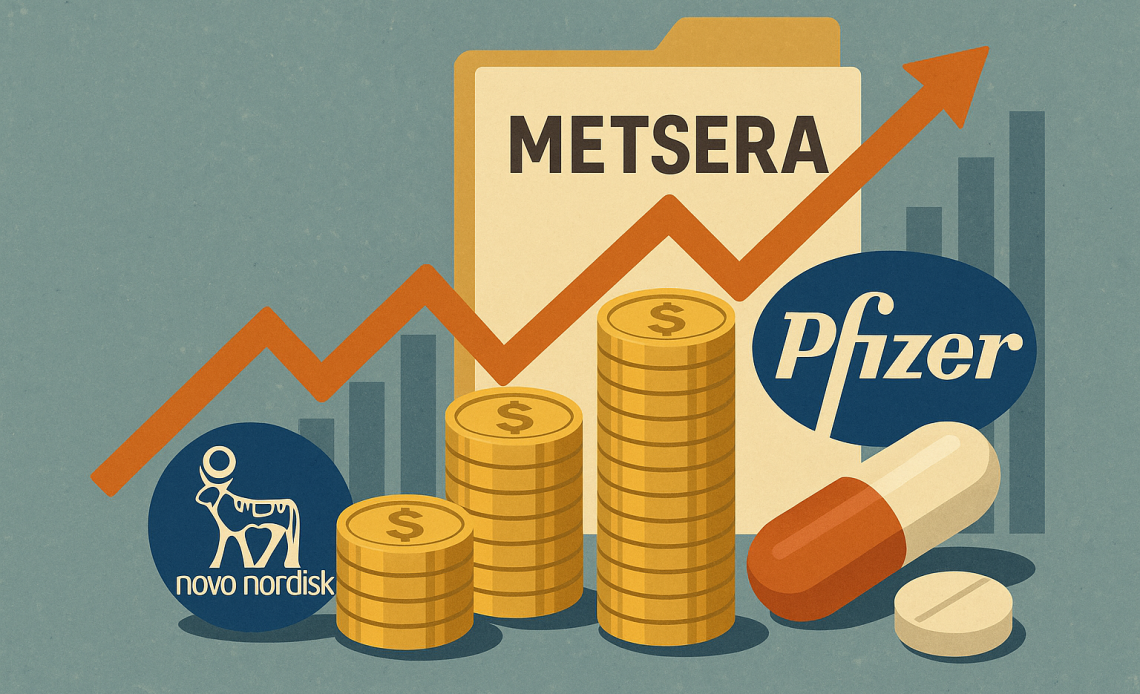In a move that highlights the escalating battle for dominance in the global weight-loss treatment market, Danish pharmaceutical giant Novo Nordisk A/S has made an improved takeover offer for US-based biotech start-up Metsera Inc.
The renewed proposal aims to beat Pfizer Inc.’s earlier acquisition agreement and strengthen Novo’s position in a market projected to reach $100 billion by 2030.
It follows Pfizer’s September agreement to acquire the start-up for $47.50 per share—an enterprise value of $4.9 billion—with an additional $22.50 per share contingent on performance milestones.
Metsera’s shares, which have tripled in 2025, closed at $52.21 on Wednesday, giving the company a market value of about $5.5 billion.
The stock jumped nearly 19% in pre-market trading on Thursday after news of Novo’s higher offer.
Pfizer shares remained little changed, while Novo Nordisk’s stock fell as much as 1.5% in Copenhagen.
Pfizer faces new competition amid declining pandemic sales
For Pfizer, the move represents an unexpected challenge as it seeks to rebuild growth after declining demand for its Covid-19 vaccine.
The US drugmaker has been looking to diversify its portfolio as several of its key products approach the end of their patent lives.
Pfizer’s own experimental obesity pill was scrapped earlier this year after a patient in clinical trials showed signs of liver injury, leaving the company with limited options in the weight-management space.
If Novo Nordisk secures Metsera, it would deal a setback to Pfizer’s plans to regain momentum in the post-pandemic era.
The acquisition would have given Pfizer a foothold in one of the most competitive and profitable therapeutic areas in modern medicine.
Metsera’s amylin drugs could redefine weight-loss therapy
Metsera is among a new generation of biotechnology firms developing alternatives to GLP-1-based drugs such as Novo Nordisk’s Wegovy and Eli Lilly’s Zepbound.
The company’s lead drug candidate is a long-acting amylin analogue—part of a class that may offer fewer gastrointestinal side effects like nausea and vomiting, which are commonly reported with GLP-1 drugs.
Metsera’s drug candidates are designed to be administered less frequently than the current market-leading weekly injections, potentially improving patient compliance.
Such innovation could redefine weight-loss therapy and help major pharmaceutical companies capture new segments of the expanding obesity-treatment market.
The competition for next-generation weight-loss drugs has intensified sharply as drugmakers seek to secure the next major breakthrough.
Global demand for effective obesity therapies continues to grow, with analysts estimating that annual sales across the sector could exceed $100 billion by the end of the decade.
Novo Nordisk’s internal shake-up and strategic push
Novo Nordisk’s pursuit of Metsera comes at a time of significant transition within the company.
Earlier this month, more than half of Novo’s board, including chairman Helge Lund, stepped down following internal disagreements about the pace of corporate change.
Former CEO Lars Rebien Sorensen, who now chairs the company’s largest shareholder foundation, has returned to take over as chairman.
The leadership changes are part of a wider restructuring aimed at revitalising the company’s “performance culture” and reclaiming its edge in the United States, its most critical market.
Novo has also replaced its chief executive this year as it seeks to maintain its lead in the weight-loss segment against aggressive competition from Eli Lilly.
Novo Nordisk’s existing flagship product, Wegovy, and its diabetes counterpart, Ozempic, have transformed the company into one of Europe’s most valuable firms.
However, the success has drawn political and regulatory scrutiny.
US President Donald Trump recently announced plans to lower the cost of Ozempic to $150 a month, adding further pressure on drugmakers to manage pricing and profitability.
The post Obesity drug rivalry heats up as Novo Nordisk tops Pfizer’s bid for Metsera appeared first on Invezz







